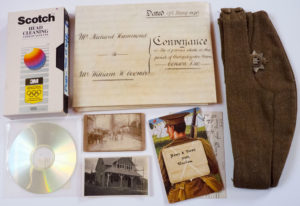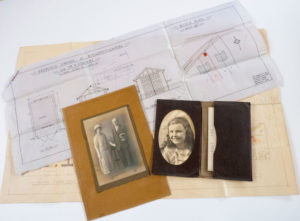Some of us probably have excellently organised photo albums, scrap books and journals that resemble the most up to date of archive strong-rooms. However, many of us still have stacks of boxes hidden in the attic gathering dust, waiting to be re-discovered and treasured!
During our (hopefully brief) period of national Lockdown, we have all been offered some extra time to work on getting closer to family, getting to know older and vulnerable neighbours, and making our own homes better places to live. As a newly qualified archives professional (and if you’re in Bishopsteignton, your friendly neighbourhood Archivist) I am putting out a call for you to take some time to look after your family archives.
But what really are ‘archives’ and why should we look after them? An archive is made up of documents, objects and other items that are records of our lives. They are a vital source of information from 1000-year-old parchment deeds to the last video you posted on Facebook. Archives of all sorts and sizes deserve to be looked after so that future generations can learn from them!

Archive material can come in any format imaginable, from parchment to plastic!
Archive repositories and their staff around the world work to preserve all kinds of records for the education of generations to come, so give them a helping hand by re-discovering the records of your family.
Spending some time going through your family archive is a great way to bring the family together and remind and teach yourselves and each other who you are, where you came from, lessons learnt and happy memories. If you are living alone at the moment, going through records of your life and your family’s history can be a great comfort and an interesting way to pass time in isolation! Furthermore, what may seem to you to be a boring old photo can be a new source of inspiration, entertainment and education to your family and others in your life.
Next up is some practical advice and some important tips on choosing what to keep and what to dispose of:
- Make sure you go through everything before disposing of anything. This means that you have a chance to put together different parts of a story.
- Identify full stories: while a photograph or letter on its own may seem totally unhelpful as a record of you or your loved ones, you may have a photograph or object to match with it as part of the story.
- Think about what you would want your family, friends and communities to be able to learn about you and your family. Remember that even negative experiences such as loss, bereavement (or even prolonged social isolation) can be very useful for educating new generations.
- Where necessary, think about paring down duplicates or as this will help if you are stuck for space! For older, fragile and damaged items, keep a duplicate just in case! Remember to look at both sides of, for example, a duplicate photograph as there may be an inscription on one print and nothing on another.
- Remember that bundles or boxes left by ancestors are probably best left in their original order so preserve this wherever possible!

Items from the Coombe family archive including plans from Philip Coombe’s business and photographs of Philip and Grace Coombe in 1925 and their daughter, Molly Coombe, at 8 years old in 1937. These are just a small part of what the Coombe family left behind.
Overall, whether you are rescuing or re-discovering your family’s archival documents and records, delving deeper into your origins, memory and history is great fun and opens doors to further research where yet more fun can be had! Keep an eye out for Part 3 in this series where I will introduce you to family history research beyond those boxes in the attic. Part 2 (coming next Friday) will feature helpful guidance on how best to store and preserve your archives while in Lockdown and beyond!
To finish off, here are some activities you can carry out towards sorting your family archives:
- Gather your photo albums, bundles of letters and piles of mementos, paperwork and souvenirs into one room and look through what you have, remembering to put things back in order!
- Pick out your favourite items and carefully photograph them and share them with us on social media or in the comments section below!
- If you have anything in your collection that you think is a valuable record of a person, place or event related to Bishopsteignton, get in touch!
- If you don’t have time to fully assess and sort through your family archive, but documents are becoming damaged due to dust, dirt, damp or pests, consider re-homing in new boxes, keeping things in their original order wherever possible and finding a cool, dry home for them out of any direct light.
